
A Confederacy of Dunces is a picaresque novel by American novelist John Kennedy Toole which reached publication in 1980, eleven years after Toole's death. Published through the efforts of writer Walker Percy and Toole's mother, Thelma, the book became first a cult classic, then a mainstream success; it earned Toole a posthumous Pulitzer Prize for Fiction in 1981, and is now considered a canonical work of modern literature of the Southern United States.

Calstock railway station is an unstaffed railway station on the Tamar Valley Line serving the village of Calstock in Cornwall, United Kingdom. It is situated at the north end of Calstock Viaduct which carries the railway at high level over the River Tamar.
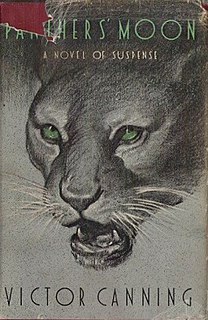
Panther's Moon is a 1948 spy thriller novel by the British writer Victor Canning. It was his second post-war novel, following The Chasm, as he had largely been taken a break from writing during his wartime service.
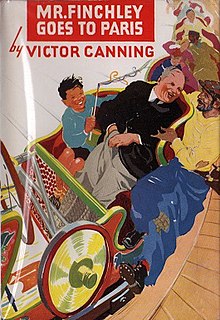
Mr. Finchley Goes to Paris is a comedy novel by the British writer Victor Canning. It was the second of a trilogy featuring the mild-mannered Edgar Finchley. The first publication in 1938 was by Hodder and Stoughton in the UK and Carrick and Evans in the USA. It was included in the Heinemann Uniform Edition of 1974, and a new edition has recently appeared (2019) from Farrago Books. In 1990 it was adapted for radio by the BBC starring Richard Griffiths
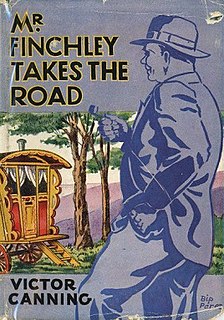
Mr. Finchley Takes the Road is a 1940 comedy novel by the British writer Victor Canning. It was the final part of a trilogy featuring the mild-mannered Edgar Finchley who had been introduced in the 1934 novel Mr. Finchley Discovers His England. First publication was by Hodder and Stoughton with an American edition by Carrick and Evans. It was included in the 1973 Uniform Edition by Heinemann, and has been reissued by Farrago Books in 2019. In 1990 it was adapted for radio by the BBC starring Richard Griffiths.
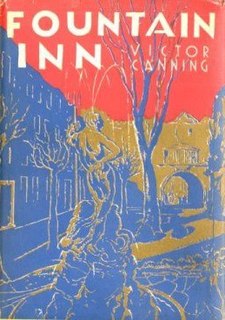
Fountain Inn is a 1939 mystery detective novel by the British writer Victor Canning. Canning had made his name with his comedy novels featuring Mr. Finchley. This was his first attempt at a thriller, but after the war he increasingly switched to writing thrillers. It received positive reviews with The Guardian noting "Fountain Inn, which is extremely well written, is the attractive kind of detective story in which the main interest is not “Who?” but “How?”". The first edition was by Hodder and Stoughton, but there was a reissue in 1974 by Heinemann, and it was republished in 2019 by Farrago Books.

A Forest of Eyes is a 1950 spy thriller novel by the British writer Victor Canning. Stylistically it owed a debt to Canning's friend, the writer Eric Ambler.

The Chasm is a 1947 thriller novel by the British writer Victor Canning. It was his first novel since the Second World War during which he had served in the Royal Artillery and was largely absent from the writing world. Later he increasingly turned to espionage and crime novels. It takes place in Italy where Canning had served during the Italian campaign.

Green Battlefield is a 1943 war thriller novel by the British writer Victor Canning. It was published by Hodder & Stoughton and was the only novel he wrote during his military service in the Royal Artillery. Although comparatively successful, and reprinted in 1944, Canning himself was later dismissive of the novel saying "It was a topical book. I spun it off to cash in on the war story thing. It was quite a competent story, but nothing I’d want in the canon of works!." Nevertheless, it was translated into Italian and French, the first time his work had appeared in those languages.
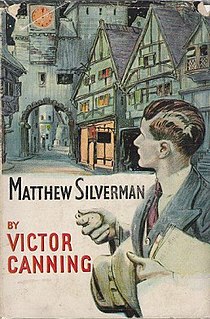
Matthew Silverman is a 1937 novel by the British writer Victor Canning, his sixth. Canning had made his name with the comedy novel Mr. Finchley Discovers His England and wrote a number of works focusing on more everyday aspects of British life before later switching to be a well-known author of thrillers. The first publisher was Hodder and Stoughton, but a new edition has recently (2019) appeared from Farrago Books under the title The Uncertain Future of the Silvermans.
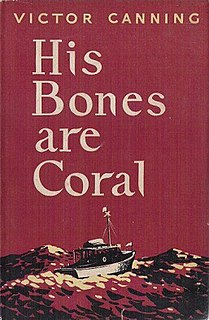
His Bones are Coral is a 1955 thriller novel by the British writer Victor Canning. It was published in the United States with the alternative title of Twist of the Knife. The title is a reference to William Shakespeare's Full fathom five from The Tempest.

Queen's Pawn is a 1969 thriller novel by the British writer Victor Canning. The title is a reference to the chess opening of the same name and the fact that much of the novel's action centres around the Queen Elizabeth 2 ocean liner. It was his first novel after finishing the Rex Carver series of spy adventures.

The Whip Hand is a 1965 spy novel by the British writer Victor Canning. It is the first in a series of four novels about Rex Carver, a private detective drawn back into his old profession of espionage. The novel also features the secret service agent Manston who had previously appeared in The Limbo Line, Canning's previous novel.

Doubled in Diamonds is a 1966 spy thriller novel by the British Victor Canning. It is the second in a series of four novels about Rex Carver, a private detective drawn back into his old profession of espionage.

The Python Project is a 1967 spy thriller novel by the British Victor Canning. It is the third in a series of four novels about Rex Carver, a private detective drawn back into his old profession of espionage. A complex plot which involves a jewel robbery and the exchange of prisoners between the British and Soviet intelligence services takes place in a variety of locations including London, Paris, Libya and the Balearic Islands.

The Melting Man is a 1968 thriller novel by the British Victor Canning. It is the fourth and final entry in a series novels about Rex Carver, a private detective drawn back into his old profession of espionage. It features the French secret agent Aristide de la Dole, who had previously appeared in Doubled in Diamonds.

The Scorpio Letters is a 1964 thriller novel by the British writer Victor Canning. Following this stand-alone novel he began his Rex Carver series with The Whip Hand the following year.

Firecrest is a 1971 spy thriller novel by the British writer Victor Canning. A stand-alone novel, it introduced a more modern, darker and naturalistic style compared to Canning's previous novels. It marked the first appearance of "The Department", a shadowy dirty tricks agency working for the British government which featured in subsequent novels.
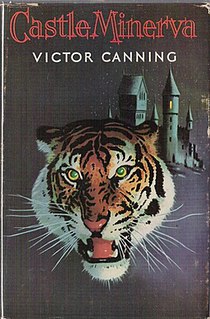
Castle Minerva is a 1954 spy thriller novel by the British writer Victor Canning. It was published in the United States under the alternative title of A Handful of Silver. A contemporary review in The Sunday Times concluded "Castle Minerva not only brilliantly entertains; it satisfies".
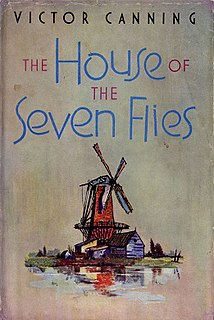
The House of the Seven Flies is a 1952 thriller novel by the British writer Victor Canning. The plot revolves around a quarter of a million pounds worth of diamonds stolen from an Amsterdam bank, and the death of the man who ex-British Army officer Edward Furse rents out his boat.




















